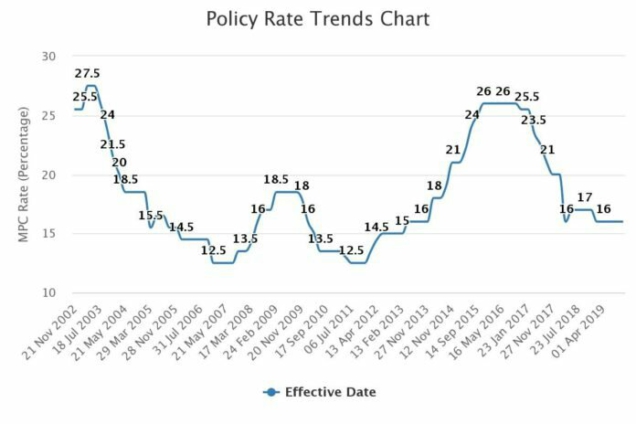The policy rate- the rate at which commercial banks borrow from the Bank of Ghana- will remain unchanged at 14.5%, at least until after the first quarter of next year, Fitch Solutions has disclosed.
This means cost of borrowing will stay largely same during the period.
The Bank of Ghana cut its base lending rate by 1.5 percentage points to 14.5% in March 2020, the first time in 14 months. The move was to stimulate spending in the Ghanaian economy and increase money supply.
Senior Country Risk Analyst for Sub Saharan Africa, William Attwell told Joy Business that there will be some monetary policy easing getting to mid-next year when economic growth picks up.
“Interest rate decisions in Ghana could come, that’s of course, till then the Bank of Ghana will hold rate [policy rate] steady. The most recent inflation is still outside of the Central Bank’s target so we would expect that ratings will hold for some time being”
Furthermore, he said “looking ahead to next year though as the Central Bank is likely to encourage recovery to gather pace next year, we would expect a bit of monetary policy easing during mid-2021,” he said.
September 2020 MPC Report
The Bank of Ghana cited risks to inflation and growth as the reason to keeping its base lending rate unchanged in September 2020.
“The Committee’s view is that risks to the immediate outlook for inflation and growth are broadly balanced and decided to keep the policy rate unchanged at 14.5%”, it said in a statement.
It however emphasized that he drivers of economic growth are returning to normal with prospects for a good recovery, adding, monetary and fiscal policies have been supportive, providing the necessary underpinnings for the economy to withstand the negative output shock arising from the covid-19 pandemic.
Interest rate development
Interest rates on the money market saw mixed developments as rates on short to medium term instruments eased between Quarter Two and Quarter Three, but generally tightened at the longer-end.
On a year-on-year basis, the 91-day Treasury bill rate declined to about 14.0% in August 2020 from 14.7% a year ago.
Similarly, the interest rate on the 182-day instrument declined to 14.1% from 15.2%.
With the exception of the 6-year bond, yields on the 7-year, 10-year, 15-year, and 20-year bonds all increased.
Presently, treasury yields are hovering around 14.5%
Latest Stories
-
I won’t advise Ofori-Atta to return to Ghana – Kofi Bentil
57 seconds -
OSP has overreached his bounds; I won’t advise Ofori-Atta to return – Kofi Bentil
6 minutes -
Declaring people wanted is unconstitutional – Kofi Bentil on OSP vs Ofori-Atta
23 minutes -
Cost of living has come down since we assumed power – Kwakye Ofosu
31 minutes -
Dumsor Levy: We won’t allow you to gaslight Ghanaians – Miracles Aboagye to Mahama government
34 minutes -
NPP’s criminal mismanagement of exchange rate contributed to energy sector debt – Kwakye Ofosu
42 minutes -
Mahama government scammed its way to power – Miracles Aboagye on Dumsor Levy
51 minutes -
Dumsor Levy ‘more than E-Levy’; NPP’s opposition justified – Kofi Bentil
53 minutes -
Dumsor Levy is a betrayal of trust – Miracles Aboagye
58 minutes -
You imposed over 30 taxes on Ghanaians – Kwakye Ofosu fires back at Bawumia over Dumsor Levy criticism
1 hour -
It isn’t too late for gov’t to engage stakeholders on Dumsor Levy – Prof Bokpin
1 hour -
Bawumia’s critique of Dumsor Levy justified – Prof Bokpin
1 hour -
Government understands public disquiet over Dumsor Levy – Kwakye Ofosu
1 hour -
Lack of consultation erodes public goodwill for new Energy Levy – Prof Bokpin
1 hour -
Ras Mubarak: Open letter to the President of the Republic of Ghana
2 hours

